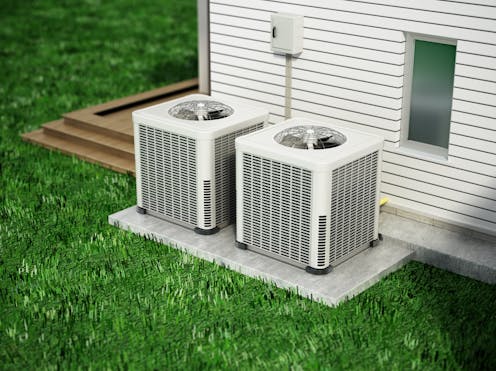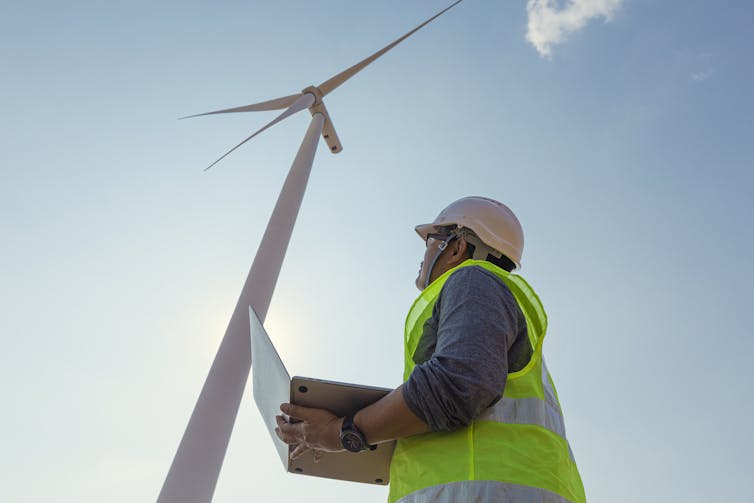Heat pumps will cool your home during the hottest of summers and reduce your global warming impact
Heat pumps can be 400% more efficient than a gas furnace.

Heat pumps can be used to both cool and heat homes. The 2022 federal Inflation Reduction Act provides financial incentives for installing one. SciLine interviewed Theresa Pistochini of the Energy Efficiency Institute and Western Cooling Efficiency Center at the University of California, Davis. She describes how home heat pumps work; how switching to a heat pump reduces your home’s environmental impact; and when to upgrade your heating, ventilation and air conditioning systems.
Below are some highlights from the discussion. Answers have been edited for brevity and clarity.
What is a home heat pump, and how does it work?
Theresa Pistochini: This decades-old technology is similar to an air conditioner, but a home heat pump also contains a reversing valve that switches the direction the refrigerant flows when you want heating instead of air conditioning.
In heating mode, the refrigerant absorbs heat from outside and pumps it inside a building using a compressor. In air conditioning mode, the refrigerant absorbs the heat inside a building and pumps it outside.
The building can be heated and cooled with the same piece of equipment by switching the mode its operating in.
How efficient are heat pumps at heating homes?
Theresa Pistochini: Efficiency varies depending on the temperature that you’re pumping against.
Let’s talk about a gas furnace for a minute. It’s burning fuel at your home, and it’s turning that fuel into heat. Furnaces are around 80% to 96% efficient.
A heat pump can be more than 100% efficient because it is not generating heat but just moving it from one place to another. This means heat pumps, depending on outdoor conditions and on the heat pump design, can be anywhere from 200% to 400% efficient. This means the system moves more heat than the energy required to operate the system. For example, an efficiency of 200% means that two units of heat are moved from outdoors to indoors for every one unit of electricity used.
Are heat pumps more efficient than air conditioners at cooling homes?
Theresa Pistochini: They should be comparable. You can compare cooling efficiency ratings when you buy a heat pump. What’s important to know is that air conditioning efficiency has improved over the last couple of decades. So if you’re replacing an older air conditioner with a brand new heat pump, you would expect a pretty big jump in efficiency and a lot of savings on your cooling bills.

How does switching to a heat pump affect a home’s global warming impact?
Theresa Pistochini: When a homeowner burns natural gas or some sort of fossil fuel at home, they create emissions on site, mainly carbon dioxide. These emissions escape to the atmosphere, and that has global warming potential.
A heat pump uses electricity – there are no on-site emissions. But it’s important to ask how was that electricity created, and what was the global warming impact associated with that? That’s changing rapidly as the way we generate electricity is evolving with the increase of renewables on the grid.
That said, based on an analysis we did here at the Western Cooling Efficiency Center, buying a heat pump today will reduce global warming impact in almost all geographical locations – basically everywhere – except maybe in the very coldest climates. And those improvements will only increase with time because the generation of electricity will continue to get cleaner.
Are there other reasons to switch to a heat pump?
Theresa Pistochini: Natural gas furnaces are fairly clean burning, and those emissions are generated outside. But there is some evidence that we get some methane leakage inside our homes from natural gas appliances. And so there are expected to be some indoor air quality benefits from switching to all electric appliances.
Why should people care about indoor air quality, and how can they improve it?
Theresa Pistochini: People spend 85% to 90% of their time indoors. We have to be concerned about what we’re breathing. And there’s increasing evidence that the more particulate matter we breathe, the more impacts on our respiratory health and life span. This is essentially an opportunity to create a safer environment in our home.
Indoor sources of air pollution are varied. Cooking can be a source, particularly without appropriate ventilation like an exhaust hood or open windows. Also burning things, like candles or incense, or any type of scented products – if you can smell a scent, those scents are created by chemicals. Cleaning products can also release chemicals inside. Smoking is hazardous to your health in general, but smoking indoors also pollutes the air for other occupants – and that includes the use of e-cigarettes.
When the outdoor air quality is poor, you should close windows and weatherproof, and then try to clean the indoor environment through filtration. Portable air cleaners are really great at this because they can remove particles that infiltrate from outdoors, and they can also remove particles we generate indoors, like from cooking. Any particle you capture in a filter is a particle that doesn’t deposit inside your lungs.
What else should people know when thinking about upgrading their heating, ventilation and air conditioning system?
Theresa Pistochini: If your system is more than 15 years old – and definitely if it’s more than 20 years old – start thinking during a non-busy time, like spring or fall, about getting some bids to replace your system and see what options are available to you. That way, you’re ahead of the curve and not having to make a rush decision.
Watch the full interview to hear more.
SciLine is a free service based at the nonprofit American Association for the Advancement of Science that helps journalists include scientific evidence and experts in their news stories.
Theresa Pistochini has received funding from the following entities in the prior five years: California Air Resources Board, Natural Resources Defense Council, National Philanthropic Trust, California Energy Commission, Trane Technologies, RMS Energy Consulting, Des Champs Technologies LLC, Daikin U.S. Corporation, Arbnco, and the Western Cooling Efficiency Center’s Affiliate Program. She is affiliated with the American Society for Heating, Refrigeration, and Air Conditioning Engineers.
Read These Next
Winter Olympians often compete in freezing temperatures – physiology and advances in materials scien
While physical exertion helps athletes stay warm, sweating can lead to dehydration.
Whether it’s yoga, rock climbing or Dungeons & Dragons, taking leisure to a high level can be good f
When a hobby becomes something larger, with a focus on improving skills and developing deep knowledge,…
Federal and state authorities are taking a 2-pronged approach to make it harder to get an abortion
Four years after the Supreme Court’s Dobbs ruling gave states the power to ban abortion, further restrictions…






